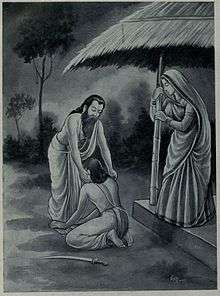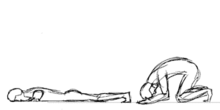Pranāma
Praṇāma (Sanskrit, "obeisance, prostration or bowing forward") is a form of respectful or reverential salutation (or reverential bowing) before something, or another person – usually grandparents, parents, elders or teachers or someone deeply respected such as a deity. It is found in Indian culture and Hindu traditions.[1]

Etymology
Pranama is derived from pra (Sanskrit: प्र) and ānama (Sanskrit: आनम); pra as prefix means "forward, in front, before, very, or very much", while ānama means "bending or stretching".[2] Combined pranama means "bending, bowing in front" or "bending much" or "prostration". In cultural terms, it means "respectful salutation" or "reverential bowing" before another, usually elders or teachers or someone deeply respected such as a deity.
Types of Pranāma

There are six types of Pranam:[3]
- Ashtanga (Sanskrit: अष्टाङ्ग, lit. eight parts) - Uras (Chest), Shiras (Head), Drishti (Eyes), Manas (Attention), Vachana (Speech), Pada (Feet), Kara (Hand), Jahnu (Knee).
- Shashthanga (Sanskrit: षष्ठाङ्ग, lit. six parts) – touching the ground with toes, knees, hands, chin, nose and temple.
- Panchanga (Sanskrit: पञ्चाङ्ग, lit. five parts) – touching the ground with knees, chest, chin, temple and forehead.
- Dandavat (Sanskrit: दण्डवत्, lit. stick) – bowing forehead down and touching the ground.
- Namaskara (Sanskrit: नमस्कार, lit. adoration) – folded hands touching the forehead. This is another more common form of salutation and greeting expressed between people.[3][4]
- Abhinandana (Sanskrit: अभिनन्दन, lit. congratulations) – bending forward with folded hands touching the chest.
Related forms of salutations
A form of pranama is Charanasparsha (Sanskrit: चरणस्पर्श, lit. touching the feet) a bowing combined with the touching of the feet, as a mark of respect. It may be seen in temples during darshan. This related type of pranama is most common in Indian culture. It is done in order to show respect towards elderly people like parents, grandparents, elderly relatives, teachers and saints.
See also
- Añjali Mudrā
- Culture of India
- Guru-shishya tradition
- Indian honorifics
- Mudras
- Namaste
- Puja (Hinduism)
- Pādodaka
Notes
- Sivaya Subramuniyaswami. Loving Ganesha. Himalayan Academy Publications. p. 481. ISBN 978-1-934145-17-3.
- Apte Dictionary, See: pra, aanama
- Chatterjee, Gautam (2001), Sacred Hindu Symbols, Google books, pp. 47–48, ISBN 9788170173977.
- Bhatia, S., & Ram, A. (2009). Theorizing identity in transnational and diaspora cultures: A critical approach to acculturation. International Journal of Intercultural Relations, 33(2), pp 140–149
External links
| Wikimedia Commons has media related to Pranama. |